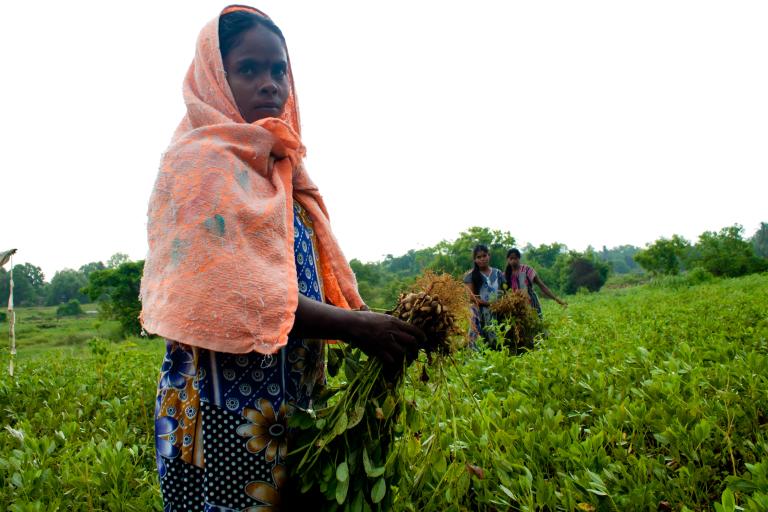
The economic impact of the COVID-19 pandemic wiped out some 81 million jobs in the Asia-Pacific region in 2020. In Sri Lanka, COVID-19 and its containment actions—e.g., border closures, curfews, and social distancing measures—drastically changed supply and demand in goods and services, disproportionately impacting trade, exports, construction, retail, and tourism, with negative impacts on jobs, wages, and enterprises. Against this backdrop, the UN worked intensively with government international partners to promote an inclusive and sustainable economic recovery in Sri Lanka, underpinned by the core mandate of decent and productive employment for all.
In 2021, the UN delivered on its goal. As the COVID-19 pandemic sent shockwaves through small-scale and informal credit markets, ILO provided a total of US$120,000 in working capital loans across nearly 100 mid-sized enterprises with majority-female workforce, leading the Central Bank of Sri Lanka to expand this initiative across the country. A new project was also launched to promote entrepreneurship among 2,500 young people.
The UN provided extensive support to returned migrant workers as a combined 97,000 Sri Lankans were repatriated from 122 countries in response to the COVID-19 pandemic. It also helped develop an integrated system for economic reintegration of returned migrant workers, including providing career guidance, supporting Recognition of Prior Learning, job search assistance, and referrals for employment both locally and abroad. ILO invested more than US$140,000 in blended training programmes for 550 returned migrants, providing the means and skills to develop business plans for transition to self-employment. ILO also worked with vulnerable groups in the former conflict zones, promoting decent work and improving livelihoods to strengthen peace and reconciliation, including supporting return of internally displaced people to newly released areas.
As the COVID-19 pandemic in Sri Lanka ground into its second year, the UN continued to support protecting workers from COVID-19-related health risks in the workplace. UNFPA provided more than US$600,000 in essential personal and protective equipment to first officers, maternal and child health workers, staff attending sexual and gender-based violence centres, and hospital staff across the country. Recognising that mid-sized enterprises in Sri Lanka are particularly vulnerable to the spread of infection due to cramped spaces and a lack of facilities for infection prevention and control, a relevant Risk Assessment study served as the basis for government Occupational Safety and Health guidelines for over 1,100 enterprises in Western Province in 2021.
The UN also contributed to protecting jobs and incomes and ensuring continuity and resilience of businesses during disruptions from public health orders. ILO designed an Employment Income Support Fund and operational guidelines for the tourism sector.
UN Women worked with over 500 female heads of households and female small enterprise owners across four districts during the COVID-19 pandemic, helping them to adapt their small enterprises to continue operations and become more resilient to future shocks. UN Women further expanded access to assets for women entrepreneurs with 62 mobile sales carts being provided to continue their business ventures in the districts of Ampara, Monaragala, and Vavuniya. UNDP also extended its assistance to over 60 young enterprises affected by COVID-19 through seed funding and incubation support under its “HackaDev Enterprise Support Programme.” Its flagship physical social innovation camp for young entrepreneurs was converted into a comprehensive six-week online learning management system.
The UN also contributed towards a more robust, skilled labour force in Sri Lanka through its investment in skills development and lifelong learning. UNDP’s Memorandum of Understanding with Sri Lanka’s Vocational Training Authority paves the way for the UN to provide learners and educators with digital skills and other resilient future-fit skilling opportunities. IOM’s successful pilot of a training programme with Sri Lanka’s Bureau of Foreign Employment put this thinking into action, upskilling aspirant Sri Lankan migrant workers—particularly women—to undertake higher-skilled advanced housekeeping work in key destination countries.
UNDP’s Social Innovation Lab “Citra Lab” provided technical assistance in Human-Centred Design to promote skill development, with capacity building for Sri Lanka’s Presidential Taskforce on Economic Revival and Poverty Alleviation and over 300 officials in the Tertiary and Vocational Education and Training sector. UNV’s V-Force volunteering platform provided skills development opportunities to some 140 young people, supporting the UN’s efforts to deliver on the 2030 Agenda.
UN Migration Network in Sri Lanka
Sri Lanka is party to the UN-facilitated Global Compact for Safe, Orderly and Regular Migration (GCM). Two national GCM committees were established in 2021 to develop and implement the country’s GCM plan, and to monitor and report progress to the International Migration Reform Forum. The United Nations Network on Migration in Sri Lanka aims to ensure effective and coordinated UN system-wide support to the government in implementation, follow-up, and review of the GCM.

